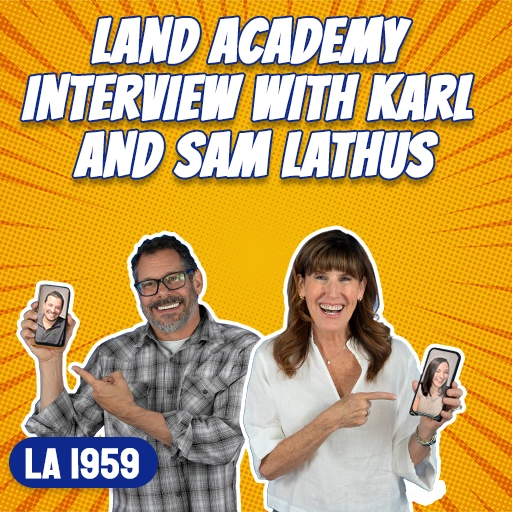Jack Thursday – How to Calculate your Cash Return on a Land Deal (LA 1592)
Jack Thursday – How to Calculate your Cash Return on a Land Deal (LA 1592)
Transcript:
Steven J Butala:
Steve and Jill here.
Jill DeWit:
Hello.
Steven J Butala:
Welcome to the Land Academy Show, entertaining land investment talk. I’m Steven Jack Butala.
Jill DeWit:
And I’m Jill DeWit, broadcasting from the Valley of the Sun.
Steven J Butala:
Today is Jack Thursday and I’m going to talk to you about how to calculate your cash-on-cash return on a given land deal.
Jill DeWit:
Isn’t it just like, you buy it for 10, you sell it for 30? Or, is there more to it than that?
Steven J Butala:
There is a little more to it than that, but that’s the basic.
Jill DeWit:
Okay, cool.
Steven J Butala:
And so, well, let’s use your example. You buy for 10. You sell for 20. What’s your cash return?
Jill DeWit:
Hundred percent.
Steven J Butala:
Right. You’ve been hanging around me too long. Buy for 10. Sell for 30. What’s your return?
Jill DeWit:
Even better.
Steven J Butala:
It’s 200%.
Jill DeWit:
Jill numbers.
Steven J Butala:
If you buy for 10, and this is a-
Jill DeWit:
Keep going.
Steven J Butala:
This is a giveaway. You buy for 10. You use deal funding. You sell for 20. You get $5,000 back. What’s your cash-on-cash return?
Jill DeWit:
50%.
Steven J Butala:
You can’t calculate it.
Jill DeWit:
Why?
Steven J Butala:
Because you didn’t put any money in.
Jill DeWit:
Oh.
Steven J Butala:
So if you want an infinite cash-on-cash return just use [crosstalk 00:01:14]-
Jill DeWit:
Okay. Well, there’s the show, everyone!
Steven J Butala:
That’s not all. Before we get into it, let’s take a question posted by one of our members on the LandInvestors.com online community. It’s free. And don’t forget to subscribe on the Land Academy YouTube channel and comment on the shows you like. It’s very interesting that whenever these shows are about numbers and technical stuff, Jill jokes around.
Jill DeWit:
Hmm. Victor wrote, “Maybe-”
Steven J Butala:
Just, hmm!
Jill DeWit:
I know, I know. “Good morning, everybody. I have spent many days researching individual counties, days on market and price by zip code. And I’ve sent two mailers for the first time yesterday. I have three other counties that I want to send to that are going to average $2,500 an acre on the buy side. But I’m worried that if I don’t get accepted offers back, I won’t have money. Meaning, that since I’m new-”
Steven J Butala:
I’m worried that I do get accepted offers back.
Jill DeWit:
[crosstalk 00:02:11] do. Sorry. I won’t have the money.
Steven J Butala:
I won’t have the cash.
Jill DeWit:
Yeah. “Meaning that since I’m new, I feel like funding partners would not be interested. Any thoughts?” Well, that’s not true. I just had a conversation with somebody about this. We have someone that we have done a handful of deals with. She wrote me a book of questions the other day, which I’m still responding to, but I hope by the time this airs, I’ve hit the reply button. But anyway, she’s like, “Do you have a bottom? Is there a bottom here that you’re willing to work with?” And I’m like, “The deal stands for itself. The deal should stand for itself. So I guess the answer is, yes and no. So don’t be afraid.”
Steven J Butala:
I can answer that. In some capacity, I’ve been involved in acquisitions since the minute I got out of college. I don’t know why, it’s just that career chose me. I will tell you, throughout my career, it has shocked me that every single person has a different acquisition criteria. Everybody wants to make money, let’s start there. Some people love cashflow. They love to buy property and sell notes. So that type of acquisition is different for them. It’s drive right up to it. Potentially use it right away. And because they know they can sell it really quickly, they’ll pay a little bit more for it to have those amenities or attributes.
Steven J Butala:
In the long-term care business, there was a certain bed number for each facility that we love to buy, which is 120, with a certain number of nursing stations so staffing can work. Other people just want pure location. And they could just work with that, because they knew the facility was always going to be full. It’s no different than the land business. So over, and over, and over again, this is why we’re developing this LandFunding.com situation. I know that every reasonably good deal that comes in, will get funded. I know that, because everybody’s got a different criteria.
Steven J Butala:
Our criterias are different, Jill and I. There’s properties that I will buy that she won’t buy, and I go do. I buy them and resell them. And vice versa. So it’s all different. Endlessly, people are saying, “That’s not to…” For a while, Jill and I were saying, “The deal’s too small.” We need to make 10 grand on this, on our side. That’s just not the case. There are people coming out of the woodwork saying, “I’d happily spend $3,000 to make 3,000.”
Jill DeWit:
Mm-hmm (affirmative). Exactly.
Steven J Butala:
Today’s topic, it’s Jack Thursday. How do you calculate your cash return on a land deal? This is why you’re listening. In a world of internal rate of return, IRR, are current ratios, long-term ratios, long-term debt. There’s just a ton of ratios and ways that you can analyze an investment. I don’t mean a land investment. I mean an investment. You might be buying stock in the stock market. You want to see how your stock is going to do over time. You might be buying a convenience store or a chain of convenience stores, or an auto dealership or a manufacturing plant. There’s a set of generally-accepted accounting principles, GAAP, it’s called G-A-A-P, where somebody standardized the way you look at money investment.
Steven J Butala:
I don’t think that necessarily applies here to us small investors, because we’re very cash driven. We need to have enough cash to stay afloat. We don’t advocate ever borrowing money, even tertiary borrowing money, like unsecured money with cards and stuff. I don’t advocate any of that. My answer to all of that is to just concentrate on getting mail out and getting good deals. Why is that? How does that fall into, let’s say I’m super technical and I have a finance background, what’s my return going to be? Or, I’m not getting started down this path.
Steven J Butala:
I’m not here to sell you anything today. I’m just telling you how I think about it and why we’ve put land funding in place. All you need to look at is your cash return, your cash-on-cash return. I put $5 on the blackjack table. I win. I collect $10 back. I made a hundred percent return on my money. It’s over, said and done. My cash-on-cash return was a hundred percent.
Jill DeWit:
Wait, wait. Is your whole point today, people are overthinking it?
Steven J Butala:
Yes!
Jill DeWit:
Got it.
Steven J Butala:
I see this all in discard all the time. And I think a lot of it’s largely because there’s a very, very small segment of people in this group, very small, less than five people, that love to show everyone else in this group, especially new people and especially me, how fricking smart they are. This is Jack Thursday. So I could say this stuff.
Jill DeWit:
Oh, yeah. The real brainy ones that dig in there. And like, “Did you do this? Do you know that? What’s exact to this? Did you just subtract that?” Who flipping cares? I doubled my money!
Steven J Butala:
Exactly.
Jill DeWit:
Even if I don’t double my money, I would just like to add this, too, because this used to be a problem for a while. People would say, “Oh, I screwed up. I messed up that deal.” “Well, how much did you make?” “Shoot, well, I bought it for 10,000. I sold it for 16,000.” How is that a fail? I’m like, “You made six grand!” They’re like, “Yeah, but I didn’t double my money.” I’m like, “So what? You made six grand!” That’s how I see it, too, by the way. Don’t get technical. Don’t get hung up on it. Are you moving forward? Are you getting getting deals? That’s it. And for a lot of people, that’s enough. If you buy for 10 and sell for 16,000 all day long, there’s nothing wrong with that.
Steven J Butala:
She’s right. And that’s very land specific and very land specific to what we do. Here’s what happens with bigger companies. Let me use a grocery store for an example, because everybody knows what that is. Grocery stores live and die by net income or net operating income, depending on how you look at it. If they generate a million in sales and they generate a hundred thousand dollars of net income or net operating income, that’s a 10% margin. If they generate $30,000, which is a lot more likely on that million, that’s 3%. We don’t care about that. I can look at our revenue. Our revenue is staggering. Our revenue is tens of millions of dollars a year. And what our net operating income is would be staggering against, I can line it up against any other business model and it’s going to really perform.
Steven J Butala:
But let’s take two or three steps back. How is that grocery store, that grocery store chain, capitalized? Oh, well we had to raise some capital over here. We put some of our own money over here. We hired a CEO. All in, we spent 20 or $30,000 for lease deposits, and inventory, and shrinkage, and all of this other stuff. So when you look at the cash-on-cash return for a grocery store or any, most of businesses, it’s atrocious. It’s absolutely atrocious.
Steven J Butala:
You have to capitalize it properly and utilize debt. And when you have debt, there’s all different types of ratios to analyze it. We don’t care about any of that. If you line this land business up against any of that, your jaw’s going to be on the desk about how well it performs. We have had 55% gross margins since the minute I started this in the early ’90s, meaning for every hundred thousand dollars of sales we have, we keep 50 to $60,000. By anybody’s measure, that’s just crazy, to the point where it’s absurd. I don’t look at it anymore.
Steven J Butala:
What I care about, and what you should care about, is how much money you put in, not for mail or education or any of that. How much money are you going to buy this property for? And how much money are you going to get back? And how fast is that going to happen? What’s your cash-on-cash return? If you’re fanatical, like I used to be for decades, I’m only going to use my money. And I’m going to get that return. And I’m going to live with it. And that was a bad decision. When I met Jill, we came off of that. And she’s right.
Steven J Butala:
Now, fast forward to 2021, where you’re in this Land Academy Group, where you don’t have to come up with any money. Your cash-on-cash return can’t be calculated, in a good way, not a bad way. It’s thousands, and thousands, and thousands of percent. You pay for the education once. You pay for the mailer as you go. That’s really your only expense. If you use LandFunding.com or whatever else, however else you get funded, wouldn’t you rather just do 50 deals, where you never put a dollar in and you made 50% on it? Versus six deals where you made a hundred percent? And you actually have to go through the hassle of calculating your cash-on-cash return. Then there’s risk. How much risk are you averting if the first three deals you funded yourself, and they were terrible deals because you’re brand new? You’re done.
Jill DeWit:
I’m letting you go.
Steven J Butala:
Cash-on-cash return.
Jill DeWit:
That was awesome. Thank you very much.
Steven J Butala:
So please calculate that and forget about the rest of it.
Jill DeWit:
I’m just a little foggy. I’m just letting you know.
Steven J Butala:
I understand. I understand, Jill.
Jill DeWit:
Thank you. Happy you could you join us today. Five days a week you can find us here on the Land Academy Show.
Steven J Butala:
Tomorrow is Jill Friday. Stop walking away from good deals. You are not alone in your real estate ambition.
Jill DeWit:
We talk a lot about people trying to dig in and make a deal when it’s a bad property. They’re just scrambling to find something, because their mailer, this is all they have to work with, and they’re trying to just ignore red flags. But then I also see the other extreme, which I’m going to talk about tomorrow, there’s a lot of people that just give up too soon. I’m like, “Hold on a moment. We need to talk about this.” Thank you for tuning in. We hope you find our content valuable and we appreciate your support. If you haven’t already, check out our YouTube channel and please hit that subscribe button.
Steven J Butala:
We are Steve and Jill.
Jill DeWit:
We are Steve and Jill.
Steven J Butala:
Information…
Jill DeWit:
And inspiration…
Steven J Butala:
To buy undervalued property.
_____________________________________________________________________________________________________________________________
If you enjoyed the podcast, please review it in Apple Podcasts . Reviews are incredibly important for rankings on Apple Podcasts. My staff and I read each and every one.
If you have any questions or comments, please feel free to email me directly at steven@BuWit.com.
The BuWit Family of Companies include:
I would like to think it’s entertaining and informative and in the end profitable.
And finally, don’t forget to subscribe to the show on Apple Podcasts.















